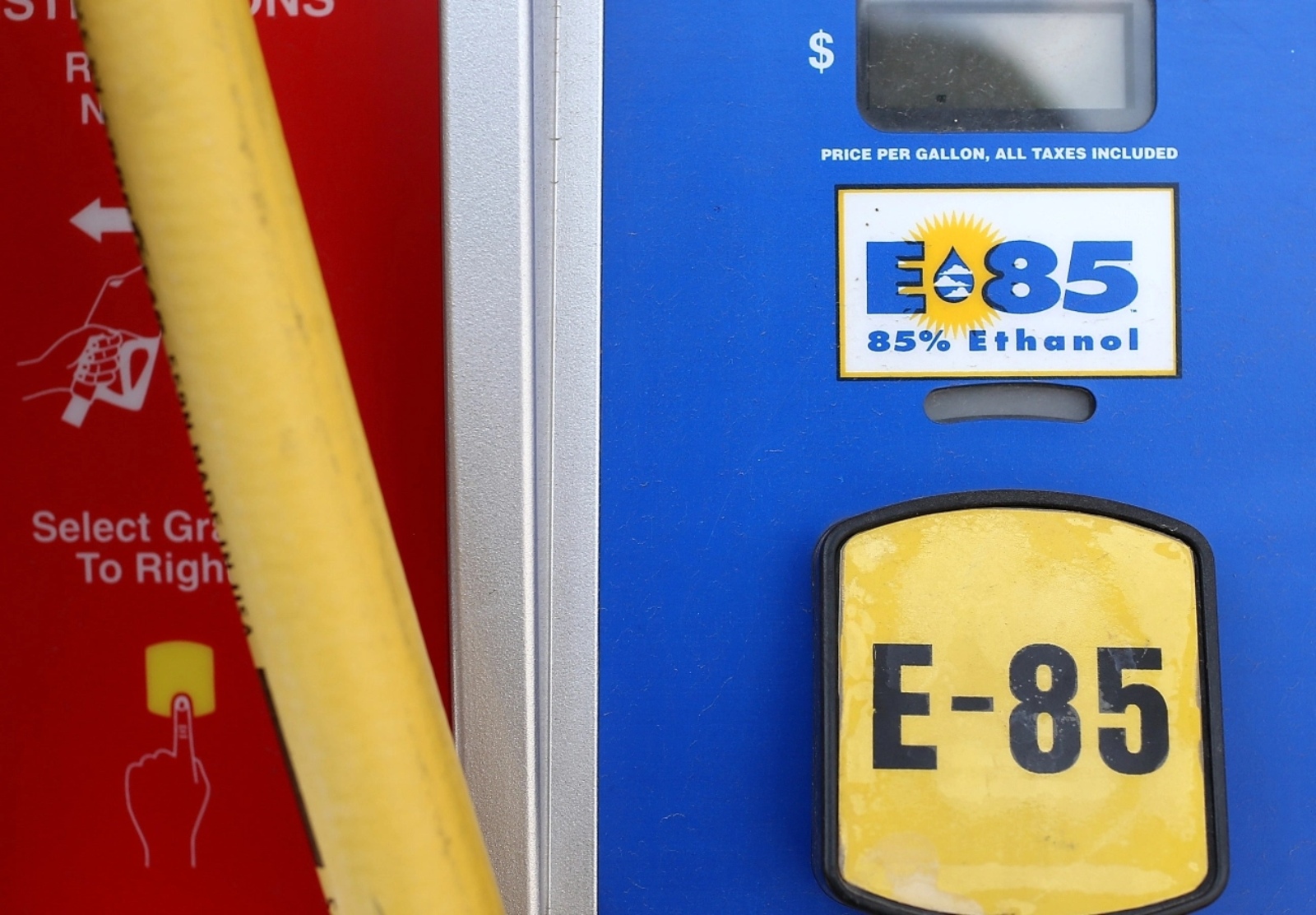Two decades ago, when the world was wising up to the threat of climate change, the Bush administration touted ethanol — a fuel usually made from corn — for its threefold promise: It would wean the country off foreign oil, line farmers’ pockets, and reduce carbon pollution. In 2007, Congress mandated that refiners nearly quintuple the amount of biofuels mixed into the nation’s gasoline supply over 15 years. The Environmental Protection Agency projected that ethanol would emit at least 20 percent fewer greenhouse gasses than conventional gasoline.
Scientists say the EPA was too optimistic, and some research shows that the congressional mandate did more climatic harm than good. A 2022 study found that producing and burning corn-based fuel is at least 24 percent more carbon-intensive than refining and combusting gasoline. The biofuel industry and Department of Energy vehemently criticized those findings, which nevertheless challenge the widespread claim that ethanol is something of a magic elixir.
“There’s an intuition people have that burning plants is better than burning fossil fuels,” said Timothy Searchinger. He is a senior researcher at the Center for Policy Research on Energy and the Environment at Princeton University and an early skeptic of ethanol. “Growing plants is good. Burning plants isn’t.”
Given all that, not to mention the growing popularity of electric vehicles, you’d think ethanol is on the way out. Not so. Politicians across the ideological spectrum continue to tout it as a way to win energy independence and save the climate. The fuel’s bipartisan staying power has less to do with any environmental benefits than with disputed science and the sway of the biofuel lobby, agricultural economists and policy analysts told Grist.
“The only way ethanol makes sense is as a political issue,” said Jason Hill, a bioproducts and biosystems engineering professor at the University of Minnesota.
President Biden’s landmark climate bill, the Inflation Reduction Act, outlined the biggest federal biofuels spending package in 15 years. Last week, its ethanol subsidies became a sticking point among House Republicans debating a bill over the federal debt limit. Eight Corn Belt Republicans staunchly, and successfully, opposed a proposal to raise the nation’s debt ceiling and curb federal spending because it would have repealed tax credits for the ethanol industry.
Regulators remain equally enamored. The ethanol industry is celebrating the EPA’s recent announcement that, for the second straight year, it will waive a ban on summertime sales of E15 gasoline. The fuel, which contains as much as 15 percent ethanol, has long been prohibited during warm months amid concerns that it creates smog. And with automakers embracing EVs, the ethanol industry is lobbying the Biden administration to extend federal subsidies to ethanol-based “sustainable” aviation fuel. Ethanol producers also plan to tap into carbon capture subsidies to build pipelines that would carry carbon from refineries to underground storage tanks.

A lot of this stems from the fact the U.S. produces more corn than any other country — 13.7 billion bushels last year — and about a third of that, worth some $20 billion, is used to produce ethanol. While biofuels can be made from all kinds of organic material, from soybeans to manure, about 90 percent of the nation’s supply comes from corn. No wonder the ethanol boom has been called the Great Corn Rush.
And a rush it has been. Although the 15 billion gallons of ethanol mixed into gasoline each year falls well short of the 36 billion that President Bush hoped for, the number of refineries in the United States has nearly doubled to almost 200 since his presidency. Between 2008 and 2016, corn cultivation increased by about 9 percent. In some areas, like the Dakotas and western Minnesota, it rose as much as 100 percent in that time. Nationwide, corn land expanded by more than 11 million acres between 2005 and 2021.
“A quarter of all the corn land in the U.S. is used for ethanol. It’s a land area equivalent to all the corn land in Minnesota and Iowa combined,” said Hill. “That has implications. It’s not just what happens in the U.S. It’s what happens globally.”
As more land at home has been tilled to grow corn for ethanol, commodity prices have gone up worldwide. In turn, growers seeking higher profits have embraced crops used to make biofuels. The expansion of soybeans and palm, in particular, has led to deforestation throughout the tropics, particularly in Indonesia and Brazil. It has also absorbed land that could be used to grow food or capture carbon. “We basically opened the floodgates,” Searchinger said.
Ethanol has failed to meet its climate promises for a number of reasons, which some researchers believe are mostly related to land use. Growing more corn means using more nitrogen fertilizer, which emits nitrous oxide, a potent greenhouse gas. Since 2007, fertilizer use tied to ethanol production has risen nationwide by up to 8 percent, according to the 2022 study denounced by the industry and DOE. More fields set aside for ethanol feedstocks also means less land for carbon-storing trees, climate-friendly food crops, or truly renewable energy sources like solar panels, which are far more efficient than plants at converting sunlight to power.
Still, many lawmakers, federal agencies, and the biofuel industry continue to insist that ethanol is better for the climate than gasoline. A 2021 Department of Energy report found that the greenhouse gas emissions from grain-based ethanol can be as much as 52 percent lower than gasoline. With more climate-friendly growing practices, that could reach 70 percent, according to a 2018 study funded by the Department of Agriculture.
“There’s been a lot of talk — and a lot of confusion — recently about corn ethanol’s carbon footprint,” Renewable Fuels Association CEO Geoff Cooper wrote in a blog post last year. He criticized what he called a “flawed and misleading approach to examining ethanol’s carbon footprint” and said that corn ethanol has a 46 percent smaller footprint than gasoline. That number comes from a 2021 analysis by researchers at Harvard University, Tufts University, and Massachusetts Institute of Technology.
But ethanol critics say such calculations don’t accurately account for the entire ethanol production cycle, from cultivation to processing, and underestimate the emissions caused by land-use changes associated with ethanol.
“The studies that look at the full life cycle of production and use of ethanol suggest that it results in increased greenhouse gas emissions relative to gasoline. [And] it doesn’t lead to lower emissions that affect air quality, say particulates. In fact, they’re higher,” Hill said.
Aside from ethanol’s environmental consequences, questions linger over its future in an increasingly electrified world. In 2011, there were 22,000 EVs on U.S. roads. Ten years later, there were 2 million. One in five cars sold around the world this year will be electric, the International Energy Agency reported last week. As electric vehicles become more popular, “you are going to see the ethanol industry looking for ways to sustain itself, and probably sustainable aviation fuel is going to be their big push,” said Aaron Smith, an agricultural economist at University of California, Davis and a co-author of the 2022 study critical of ethanol.
The Department of Energy says ethanol jet fuel could reduce greenhouse gas emissions by as much as 153 percent compared to its petroleum counterpart. Hill said it has the same problems as the ethanol used to power cars. “There’s no reason to think they’re any different,” he said.
Yet two years ago, the Biden administration set a goal of producing 3 billion gallons of sustainable aviation fuel by 2030. Just last month, two House Democrats — Julia Brownley of California and Brad Schneider of Illinois — re-introduced the Sustainable Aviation Fuel Act, which would authorize $1 billion of federal funds to spur growth in the industry. To qualify for the subsidies, fuels must emit 50 percent fewer greenhouse gasses during their life cycle than oil-based jet fuel. Only time will tell if the new use of ethanol delivers the future the fuel’s supporters have long promised.
This story was originally published by Grist with the headline Despite what you may think, ethanol isn’t dead yet on May 5, 2023.
This content originally appeared on Grist and was authored by Max Graham.
Max Graham | Radio Free (2023-05-05T10:45:00+00:00) Despite what you may think, ethanol isn’t dead yet. Retrieved from https://www.radiofree.org/2023/05/05/despite-what-you-may-think-ethanol-isnt-dead-yet/
Please log in to upload a file.
There are no updates yet.
Click the Upload button above to add an update.
